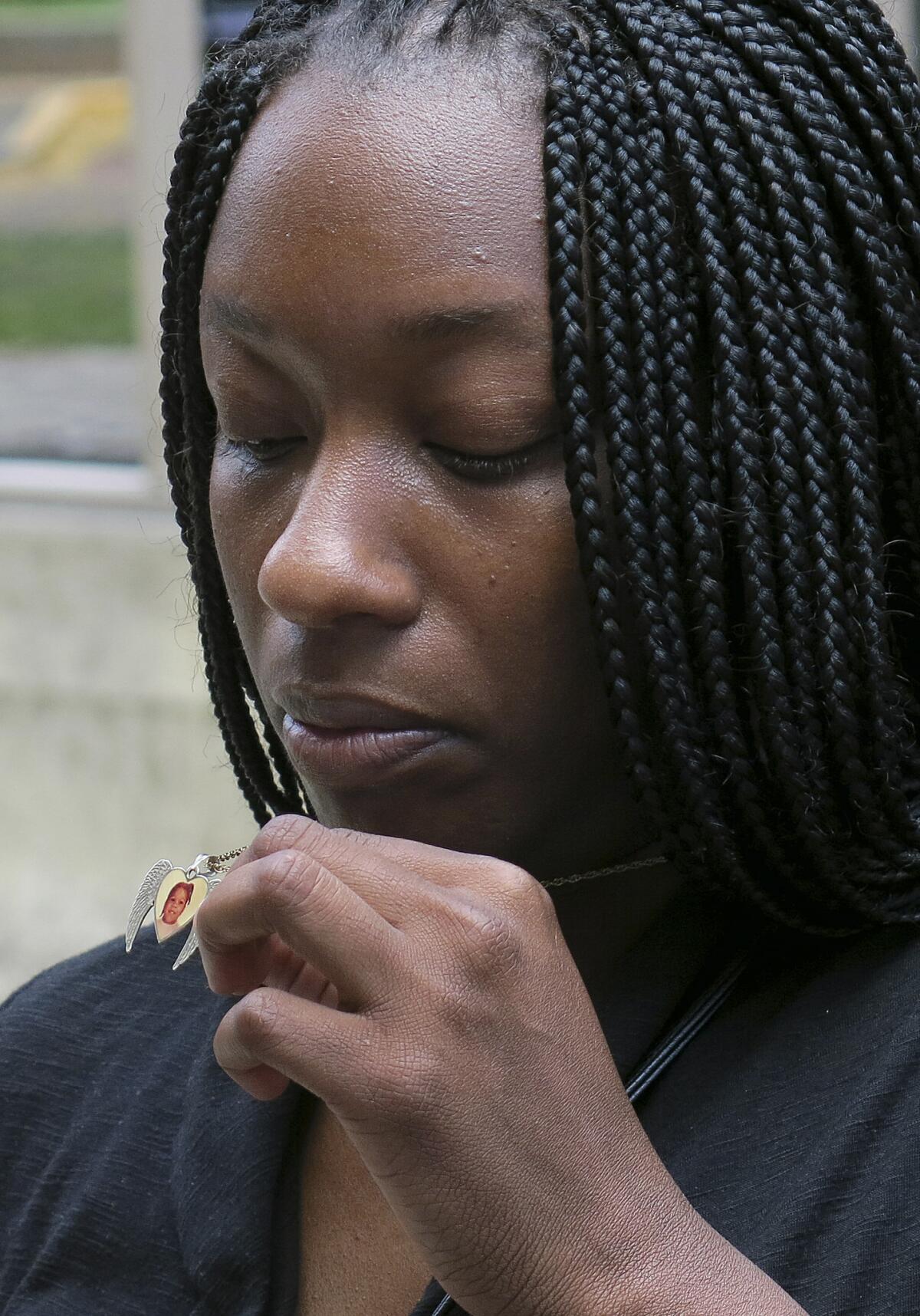Ex-soldier, convicted of murdering daughter, could face death penalty

- Share via
A former Army soldier was convicted Thursday of beating his 5-year-old daughter to death on a Honolulu military base in 2005.
Next, the federal court jury must decide whether to recommend that Naeem Williams, 34, be sentenced to death.
Hawaii has no capital punishment, but Williams could face the death penalty because the murder occurred at Wheeler Army Airfield, where the Williams family lived. The case was tried in federal court, where capital punishment remains an option. He could also face life in prison without possibility of parole.
The jury is scheduled to return Tuesday to begin considering his punishment.
During the trial, Williams’ wife, Delilah, testified against him as part of a deal struck in 2006 to plead guilty to murder in exchange for 20 years in prison.
Delilah Williams, 30, demonstrated to the jury how she repeatedly stomped on Talia Williams a couple weeks before the child died. She admitted grabbing her stepdaughter by the hair and throwing her against a wall with such force that the wall cracked.
But Delilah Williams blamed her husband for Talia’s death, testifying that he struck the child hard enough to damage her head and kill her. Talia’s body had bruises on the arms, chest, knees and thighs.
The Williamses were charged a month after Talia’s death, and they admitted to investigators that they had beaten the child. But the case moved slowly through the courts.
In court filings and at a month-long trial, prosecutors said there was “a pattern and practice of assault and torture” of Talia that involved belts, a ruler, punches, starvation and duct-taping her to a bed. The abuse, which stretched over nearly seven months, stemmed from the couple’s struggle to potty-train the special-education kindergartner, prosecutors said.
On the day she died, Talia had received a lashing from her father because she had urinated on herself, according to court documents. After she did it again later in the day, he hit her again. Talia fell, smashing her head into the floor. He poured water on her in a bathtub to revive her, prosecutors said.
Talia remained unconscious and was probably dead, Delilah Williams told investigators. But the couple didn’t call police for two hours, giving a relative enough time to come get the couple’s 4-month-old daughter, Azrah.
Court filings show that authorities found blood-spattered walls and a child’s bedroom without any furnishings.
Delilah Williams testified that the couple pulled Talia out of school and left her at home unattended to try to keep people from seeing her bruises. When military officials responding to a call inquired about Talia’s injuries, the parents brushed it off as accidents, according to media accounts of the trial.
The stepmother, who worked at a day-care facility on the base, testified that Talia was regularly denied food for days at a time.
Tarshia Williams, Talia’s birth mother, also testified. She said she last saw Talia in 2004, when Naeem Williams left South Carolina after being granted custody of their daughter, the Honolulu Star-Advertiser reported. The birth mother lost custody because a judge found that she had contributed to the girl’s malnourishment. She denied it, saying Talia had developmental disabilities because of premature birth, the paper reported.
On the witness stand, Delilah Williams blamed some of the family turmoil on her husband, whom she said had been sleeping around and staying out late. Naeem Williams’ attorney, John Philipsborn, told jurors that Delilah Williams was at fault because she became overbearing and aggressive. Philipsborn said Talia died not from a single blow, but from repeated abuse for which Delilah Williams was also responsible.
The jury convicted Williams on all five counts: murder through child abuse, murder through assisting in child abuse, conspiracy to murder, tampering with a witness and lying to investigators.
The jury found Williams guilty of killing his daughter on July 16, 2005, by engaging in child abuse that included beating and punching her. Williams was also convicted of participating, along with Delilah Williams, in a pattern and practice of assault and torture from December 2004 until the end of Talia’s life that resulted in her death.
In addition, Naeem Williams was convicted of conspiring to engage in a pattern and practice of assault and torture leading to death, obstructing justice, and making false statements to Army Criminal Investigation Division agents on the night of his arrest in July 2005.
His attorney did not immediately respond to a request for comment.
Tarshia Williams told the Associated Press that she was happy with the verdict.
“She can rest now that her killer is guilty of what he did to her,” Tarshia Williams said. “Now my daughter can rest in peace despite all the pain she went through.”
Hawaii abolished the death penalty about two years before it became a state in 1959. Efforts to reinstate capital punishment have failed repeatedly.
Federal prosecutors rarely pursue the death penalty in states where it’s outlawed, but former U.S. Atty. Gen. Alberto Gonzales decided to seek it in this case in 2006.
Seven of the 59 people on the U.S. government’s death row are from states that had no death penalty when the sentence was imposed, the Death Penalty Information Center reported last fall.
Follow LATimes National on Facebook
ALSO:
NRA to mix politics with gun rights at Indianapolis convention
New Jersey forest fire scorches 300 acres, damages several homes
‘Our hearts are broken,’ friend says of Chicago doctor shot in Afghanistan
More to Read
Sign up for Essential California
The most important California stories and recommendations in your inbox every morning.
You may occasionally receive promotional content from the Los Angeles Times.











